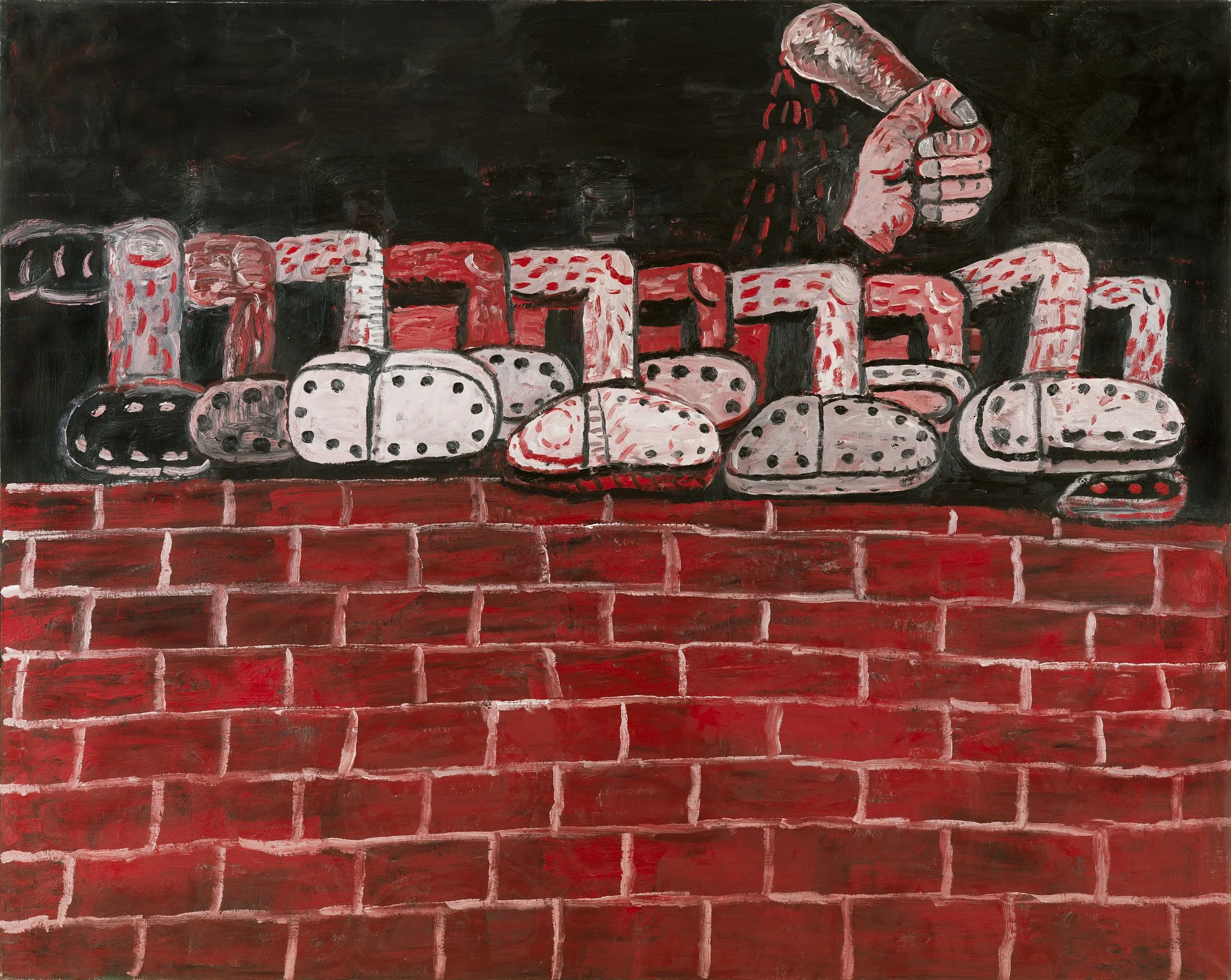Difficult conversations
How can a small liberal arts college remain small but seem so large at the same time? You make friends, share the work, and build alliances. COA has spent the last 50 years building alliances in and outside of Maine that benefit the entire COA and Mount Desert Island communities. We are small but we are not isolated. Since our founding, COA has hosted everything from the Maine Poets Festival to the International Conference of the Society for Human Ecology. Some COA students travel all over the world pursuing their educational goals while others take advantage of opportunities closer to home. The spirit of human ecology animates and connects all things at COA, and with each new incoming class the dynamic impact of new faces, new work, and new alliances grows exponentially.
Philip Guston, Discipline, 1976.
In September 2020, the directors of four museums scheduled to participate in an international retrospective tour of the work of artist Philip Guston (1913-1980) canceled the tour, postponing it until 2024. A joint statement released by the museum directors stated that they were “postponing the exhibition until a time at which we think that the powerful message of social and racial justice that is at the center of Philip Guston’s work can be more clearly interpreted.” This decision led to public debates about race and censorship, privilege, and freedom. One of the main questions these debates raised is whether institutions such as museums, colleges, and universities have an institutional responsibility to engage in difficult conversations.
In November 2020, College of the Atlantic lecturer Josh Winer ’91 sent out an email to the COA community with a link to a panel discussion about Guston’s retrospective tour and its cancellation. This inspired professor of cultural anthropology Netta van Vliet to organize a COA panel discussion about the topic. “At COA, where faculty have private conversations with each other about what’s happening in the public domain and how these issues overlap—or resonate—with subject matter they are teaching,” van Vliet says, “why not make those conversations public and invite students into the mix?”
In February 2021, the panel “Philip Guston Now and Questions of Art, Politics, Curation and Interpretation” was held. The panel featured COA professors Catherine Clinger, Allan Stone Chair in the Visual Arts; Nancy Andrews, T.A. Cox Chair in Studio Arts; and professor of painting and drawing Daniel Kojo Schrade. It was a huge success and showed—during the ongoing pandemic—the COA community was starving for more engaged and engaging discussions. This kind of undertaking is fundamental to COA’s core mission.
The fact that the Guston panel was well attended, and sparked much conversation and enthusiasm, led van Vliet to organize two more panel discussions in the spring term. These were informed by a class she was teaching on the thought of Frantz Fanon. Interested in broadening the conversation to include neighboring institutions, van Vliet contacted colleagues at the Philosophy Department at the University of Maine and the Humanities Institute at Colby College, who enthusiastically and generously cosponsored two panel discussions in the spring of 2021: “Black Studies and Questions of Institutional and Structural Change: A Discussion with Charisse Burden-Stelly and Jonathan Fenderson,” and “On Questions of Structural Change: The Human, Afropessimism, and Indignity; a Discussion with Frank B. Wilderson III and Ranjana Khanna.” These collaborative events made it possible for students, faculty, and community members from all three institutions, along with people from across the country (and even a handful from around the world), to participate in these conversations.
“It was really exciting,” notes van Vliet. “There were people Zooming in from Maine but also from Africa, Europe, and Australia. The panelists brought different questions and ways of thinking to the table, and audience participants asked some really excellent and critical questions. I think it is important for there to be spaces for people to be challenged, to think out loud together in the moment, and to engage in conversation where disagreement and critical questions are not only possible but welcomed, whether that thinking happens through writing, performance, painting, or other modes of articulation.
“Initially, what was most exciting about the panel discussions was just being able to bring these speakers into conversation and have students and faculty from other colleges be able to engage with them. But it was also rewarding and a pleasure to meet and collaborate with colleagues at other institutions in Maine… and they were also really excited. We all said we would like, when the pandemic ends, to try to continue such conversations in person. Each institution could contribute in terms of organizing labor or funding. It is still a work in progress,” notes van Vliet, “but we are all looking forward to future collaborations.”

